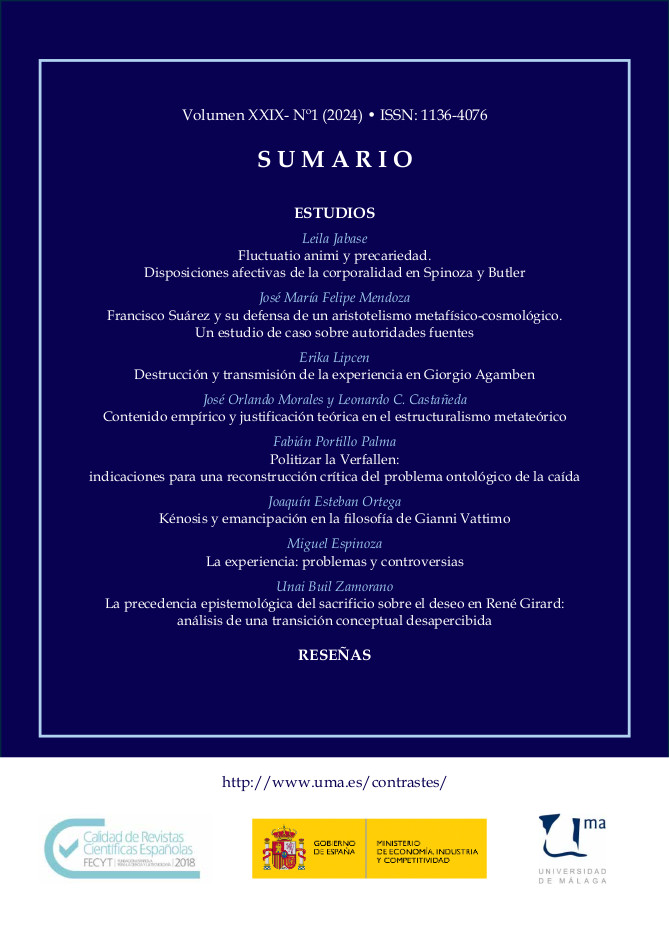Fluctuatio animi and precariousness. Affective dispositions of corporeality in Spinoza and Butler
DOI:
https://doi.org/10.24310/Contrastescontrastes.v28i3.15717Keywords:
Affects, body, fluctuation, individuation, precariousness.Abstract
We will deal here with the relationship between Spinoza and Butler with regard to the affective constitution of every body. We will see how, for Butler, the life of the individual is presented in conditions of precariousness and vulnerability and, for Spinoza, in a constant state of soul fluctuation in which external causes affect us in a way that can often involve our own disintegration. We will see how both philosophies converge on this point. We will also attend to Butler's interpretation of the Spinozian concept of conatus and “desire” as the very nature of every human individual.
Downloads
Metrics
References
Balibar, Etienne (2009), Spinoza de la individualidad a la transindividualidad, Córdoba: Encuentro Grupo Editor.
Butler, Judith (1988) “Performative Acts and Gender. Constitution: An Essay in Phenomenology and Feminist Theory”, Theatre Journal, 40:4, pp. 519-531. https://www.jstor.org/stable/3207893
Butler, J. (2006) “Violencia, duelo, política”, en Vida precaria. El poder del duelo y la violencia. Buenos Aires: Paidós, pp. 45-78.
Butler, J. (2010), Marcos de guerra. Las vidas lloradas, Buenos Aires: Paidós.
Butler, J. (2015), “The desire to live. Spinoza’s Ethics under pressure”, en Senses of the subject, New York: Fordham University Press, pp. 63-89. https://doi.org/10.1515/9781400827152.111
Descartes, R. (2002) Principios de la filosofía, Barcelona: Alianza.
Gatens, Moira (2009), (ed.) Feminist interpretations of Benedict Spinoza, Pennsylvania: The Pennsylvania State University Press.
[Datos de autoría suprimidos para evaluación ciega].
[Datos de autoría suprimidos para evaluación ciega].
Kearney, R. (1982), “Ethics of the Infinite” An interview with Emmanuel Levinas en Cohen, R., (ed.). Face to Face with Levinas, Albany: SUNY Press, pp. 13-33.
Sangiacomo, Andrea (2019), “A Spinozistic Approach to Relational Autonomy: The Case of Prostitution” en Spinoza and Relational Autonomy. Being With Others, Aurelia Armstrong, Keith Green, Andrea Sangiacomo (eds), Edinburgh: Edinburgh University Press, pp. 194-211.
Sharp, Hasana (2011), Spinoza and the Politics of Renaturalization, Chicago: The University of Chicago Press.
Spinoza, B. (1925) Opera quae supersunt omnia, Heidelberger Akademie der Wissenschaften, editada por Carl Gebhardt, 4 tomos, Heidelberg: Carl Winter-Verlag.
Spinoza, B. (2009) Ética, traducción de Vidal Peña, Madrid: Alianza.
Spinoza, B. (2007) Epistolario, traducción de Oscar Cohan, Buenos Aires: Colihue Clásica.
Spinoza, B. (1990) Tratado Breve, traducción de Atilano Domínguez, Madrid: Alianza.
Zourabichvili, François (2014), Spinoza. Una física del pensamiento, Buenos Aires: Cactus.
Downloads
Published
How to Cite
Issue
Section
License
This journal provides immediate free access to its content under the principle of making research freely available to the public. All content published in Contrastes. Revista Internacional de Filosofía, are subject to the Creative Commons Attribution-NonCommercial-ShareAlike 4.0 license whose full text can be found at <http://creativecommons.org/licenses/by-nc-sa/4.0>
It is the responsibility of the authors to obtain the necessary permissions of the images that are subject to copyright.
Authors whose contributions are accepted for publication in this journal will retain the non-exclusive right to use their contributions for academic, research and educational purposes, including self-archiving or repository in open access repositories of any kind.
The electronic edition of this magazine is edited by the Editorial Service of the University of Malaga (Uma Editorial), being necessary to cite the origin in any partial or total reproduction.









5.png)
